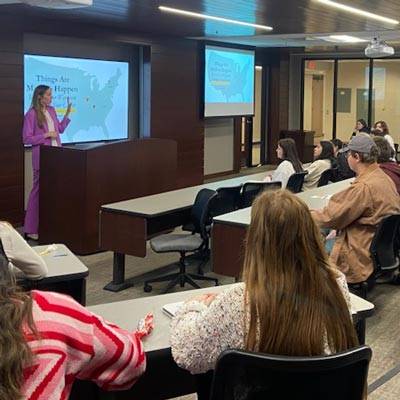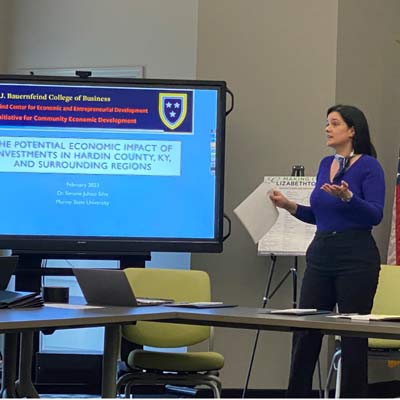Economics
Major | Minor
Main campus
financeThe Department of Economics and Finance offers majors in economics and finance, minors in economics, finance, business economics, and international economics, a Master of Science in Economic Development and a Master of Science in Economic Analytics.
Economics is one of the most versatile majors. The program is designated as STEM and allows students to tailor the program to their career goals in business, finance, healthcare administration, law, politics, foreign affairs, government and more.
The finance program prepares students for careers in financial planning, banking, corporate finance, securities analysis, investment and insurance.
The Master of Science in Economic Development prepares students for work in the field of local and regional economic development. The program offers Agribusiness Concentration.
The Master of Science in Economic Analytics places a strong emphasis on mastering data analytics and quantitative methods, skills that are increasingly valuable and sought-after in today's rapidly evolving big data and artificial intelligence landscape. It is a STEM program and offers Finance Concentration.
The department also offers Accelerated Bachelor’s to Master’s (4+1) programs:
Bachelor’s to MS in Economic Development: qualified undergraduate students pursuing any major in the Arthur J. Bauernfeind College of Business, or agricultural science in the Hutson School of Agriculture, who have already completed 70 credit hours, can apply to the program and complete their bachelor’s degree along with MS in Economic Development by fulfilling up to 12 credit hours of undergraduate course requirements at the graduate level.
Bachelor’s to MS in Economic Analytics: qualified undergraduate students majoring in accounting, business administration, computer science, computer information systems, economics, finance, logistics and supply chain management, management, marketing, or mathematics, who have already completed 60 credit hours, can apply to the program and complete bachelor’s to MS in Economic Analytics program by fulfilling up to 12 credit hours of undergraduate course requirements at the graduate level.

Allen North, Vice President of Safety and Soundness Supervision, and Stephen McMorries, Senior Examiner, from the Federal Reserve Bank, both alums of MSU Bauernfeind College of Business, spoke to Dr. Steve Lacewell's Bank Management class about the banking system's status and careers as bank regulators.

Chris Wooldridge, director of Murray State’s Center for Economic and Entrepreneurial Development (CEED) and faculty member in the Department of Economics and Finance, was awarded the a “Commonwealth Champion for Economic Development” award by KAED.

The Arthur J. Bauernfeind College of Business Alumni Speaker Series featured Jaime Staengel, Class of 2017 and currently a member of the Finance Leadership Development Program at Anheuser-Busch, who gave a presentation titled "Making your way from Murray to your career."

Congratulations to Greta Culler! She was presented the 2023 Pugh Family Outstanding Senior in Economics Award. Greta is heading to the University of Arizona to pursue a PhD in Economics.

Congratulations to Patrick Henderson! He was presented the 2023 Pugh Family Outstanding Senior in Finance Award. Patrick is headed to Dallas, TX, to start his career at Vanguard.

The Department of Economics & Finance sponsored an interactive information session about the benefits of pursuing an economics degree. The event featured talks from department faculty and was a major hit, attended by over 50 students from across campus.

Murray State students advanced to the second round of a banking competition with 13 other teams. With help from Dr. Nochebuena-Evans and Dr. Dunn, they focused on community banking, technology, and recruitment, collaborating with Murray Bank for data analysis and interviews.

John Buchanan, an MSU graduate student in Economic Development, was awarded two Certificates of Appreciation by the Kentucky League of Cities and Murray State for his internship(s), marking the ongoing growth of MSU's partnership with KLC.

Dr. Simone Silva, joined by Chris Wooldridge, presented an economic analysis of the BOSK project in Elizabethtown, KY. The study, prepared by the Kentucky League of Cities and MSU, explored the potential economic impacts of the project in Hardin County and the surrounding region.

The Department of Economics and Finance and The Center for Economic Education held a "Fun with Economics" camp for high school students from KY and TN. The students enjoyed games, prizes, food, and learned about the economic way of thinking and its application to everyday life.
Economics students have a wide choice of curricula with a mixture of business and non-business courses focusing on how individuals, businesses, and government make decisions, how markets work, and how economic forces affect market outcomes and social systems. In this current age of "Big Data," the program equips students with the requisite knowledge in economic modeling, econometric methods, and computational skills to create, analyze and interpret large-scale data initiatives.
Students in the finance program can pursue an area of finance, finance with financial planning track or finance with commercial banking track. The financial planning option is approved by the Certified Financial Planning Board of Standards, and provides students with the background necessary to be allowed to take the test for CFP certification. The commercial banking option prepares students for employment with a commercial bank or bank regulatory agency. The classes were formulated through much interaction with the Center for Banking and Finance Advisory Board, which consists of executive bank officers and regulators.
Major | Minor
Main campus
financeGraduate | Graduate Certificate
Main campus | Online
financeArea | Graduate
Main campus
financeArea | Minor
Main campus
economicsArea
Main campus
economicsArea
Main campus
economicsGraduate | MBA
Main campus | Online
Graduate | MBA
Main campus | Online
Minor
Main campus
financeMinor
Main campus
financeAre you interested in what courses you'll need to take each semester? Our course paths provide an easy to follow guide of recommended courses divided by year and semester.